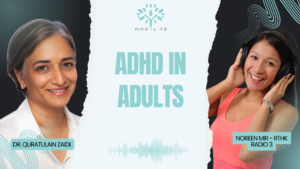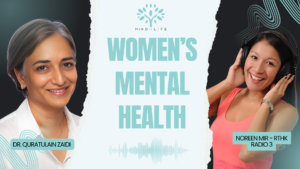Anxiety and what we can do to cope
Stress and anxiety can be motivating and healthy in just the right amount. Think of it as a well-being scale. Too little stress and we don’t get anything done. Yet too much pressure keeps our nervous system on a drive without any brakes. When our bodies undergo chronic stress, our immune system takes a hit, and we can experience respiratory, heart, gastrointestinal, and pain issues. In addition, chronic stress sends stress hormones throughout our bodies, alerting our minds that something isn’t right. If we feel stuck and can’t sort out our stressors, we might develop anxiety or feelings of overwhelm.
Ways anxiety manifests itself
Anxiety, like stress, is on a spectrum. Our body reacts to constant worry and anxiety much in the same way as chronic stress. Anxiety can be incredibly uncomfortable and can lead to lashing out, hypervigilance, phobias, relationship issues and, on the high end, Obsessive-Compulsive Disorder. Obsessive-Compulsive Disorder is terribly painful, and it feels as if your brain is always catastrophizing. To reduce the anxious thoughts, sometimes compulsions lessen the anxiety. But the problem is that the compulsions only reduce the anxious thought for a short amount of time and can lead to higher levels of overthinking and anxiety in the long term. The more we avoid what makes us anxious, the bigger our anxiety tends to get.
Attachment anxiety is a form of anxiety related to relationships. Have you ever thought you loved your partner more than they loved you? or that when you need your person, they might not be there for you? These are a few ways this type of anxiety can exist. It might also lead to feelings that you are not worthy of love, relationship issues and low self-worth. We have attachment styles in general that are also related to relationships. There are many different factors that makeup attachment anxiety. If you have overall attachment anxiety, this is a sign that it could be related to clinical anxiety. If you have attachment anxiety to a particular person, there might be indications that your relationship needs some work. You can check your attachment profile here.
How do we cope?
The good news is that there are tools and ways to cope with stress, overwhelm and anxiety. George Bonanno, resilience researcher and director of the Loss, Trauma, and Emotion Lab at Teachers College, Columbia University, found that certain traits in a flexible mindset enable resilience. These traits include optimism about the future, confidence in our ability to cope and seeing stress and crises as challenges.
Here are a few things to consider when feeling overwhelmed, stressed or anxious:
- How is this stress, anxiety, overwhelm or overthinking affecting your life? Suppose you feel that your stress levels and anxiety are now harming your health, relationships, ability to work and enjoy life. In that case, it is probably time to seek help. Specific therapies such as brainspotting and EMDR rely on your brain’s ability to heal itself using the concepts of neural plasticity. Neurons that fire together, wire together. Suppose you are concerned that you might have Obsessive-Compulsive Disorder. In that case, brainspotting can help to rewire your brain for optimism and away from catastrophising.
- Is my anxiety related to my relationship? If you are experiencing anxiety only related to your relationship, perhaps you need to take a deeper look at your view of yourself and others. For example, is the person you have attachment anxiety with attachment avoidant? Are they emotionally abusing you? Do you have a history of neglect and abandonment that is now creeping into the present?
- Avoiding can make stress and anxiety worse unless it is a boundary. Avoiding what makes us anxious, such as phobias, can worsen our anxiety. For example, suppose I am afraid to get in the car after a car accident. In that case, my anxiety will continue to be there unless I get in the car. This can also mean conflict avoidance. If we have tension with another person, avoiding that conversation can make us anxious. However, if someone has abused us, boundaries and avoidance of the abuser are crucial to restoring our safety.
- Overthinking, overthinking, overthinking. Sometimes, anxiety can feel like a brain that never slows down or shuts off. The more you overthink the less you might sleep, and the more your body reacts. Overthinking, or ruminating is your brain’s way of tricking you into thinking that you are being proactive about a stressor. Overthinking is not proactive and can lead you to take less action. When this happens, it is a good idea to take out a piece of paper, write it out, and develop a plan. Once you have a plan, set realistic goals and believe in your ability to reach those goals. Sometimes speaking to a loved one or a professional can also help you get all of those thoughts out of your head and offer some perspective.
- Decompress daily. Anxiety and stress can make our nervous system go haywire. Ideally, it would be nice for your body to decompress by doing something relaxing or unwinding daily. This looks different for everyone. What relaxes you? What happened during the day that you might need to process through writing or speaking to someone?
- Practice self-compassion and take care of your body. Self-compassion allows you to be more psychologically flexible. For example, suppose you grew up with verbal or emotional abuse. In that case, you might speak to yourself in a critical or abusive way. Self-compassion is calming and allows us to meet challenges with less stress and anxiety.
Contact
Dr. Monica Borschel offers brainspotting and EMDR through the MindNLife Clinic. Please get in touch and book your appointment here.







